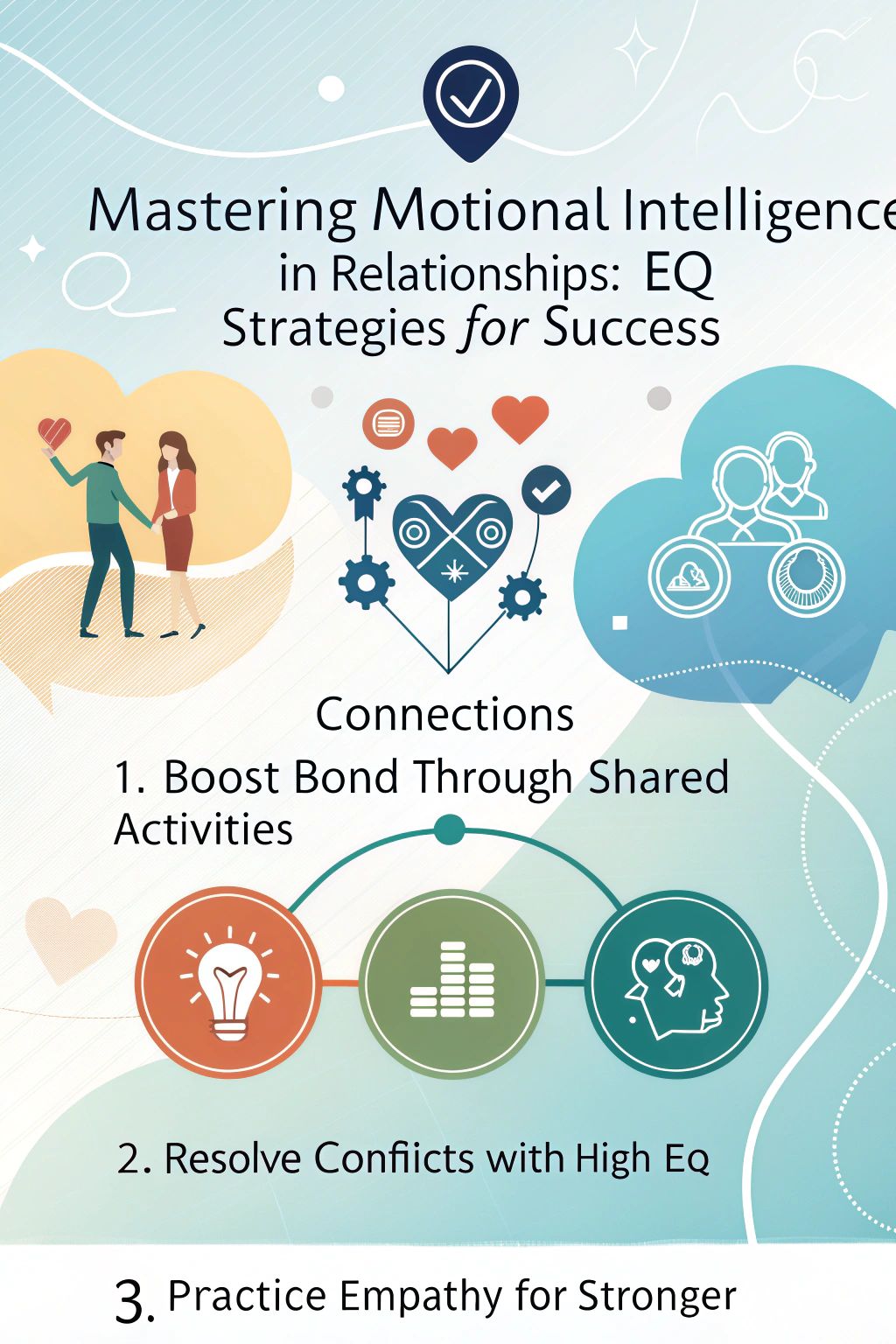Numerous individuals find maintaining a robust and joyous relationship challenging. This could be due to difficulties in comprehending and handling their feelings and those of their significant other.
Emotional acuity in relationships serves as a pivotal factor in surmounting these obstacles.
One thing is clear: emotional intelligence is vital for profound and enduring affection amongst partners. Our blog can guide you on enhancing your emotional quotient to better your interaction, empathy, and comprehension with your cherished one.
Keen to bring about a transformation? Continue reading.

Understanding Emotional Intelligence (EQ)

Comprehending Emotional Intelligence (EQ) involves acknowledging and handling emotions, both in oneself and in others. It plays a vital role in relationships, impacting communication, conflict resolution, and the emotional bond between partners.
The capability to comprehend and manage emotions effectively encourages a deeper connection and enhances overall emotional well-being within romantic relationships.
Definition and Importance in Relationships
Emotional intelligence or EQ holds a pivotal role for maintaining strong, intimate connections. It assists both individuals in a relationship to become cognisant of their own as well as each other’s emotional changes.
Such consciousness is the key for comprehending feelings and actions within a relationship. High EQ capabilities encompass identifying emotions, acknowledging them, and utilising this knowledge to comprehend their impact on the relationship.
EQ is important as it permeates every aspect of sharing life with someone. It utilises five primary components: understanding personal emotions (self-awareness), identifying emotions in others (social awareness), managing personal feelings (emotional regulation), empathising with others (empathy), and overall emotional wellness (well-being).
These factors facilitate improved communication amongst couples, peaceful resolution of differences, and establishing a profound bond. Studies have also indicated that a robust self-awareness component of EQ may make individuals more receptive to anxiety and depression problems, which underscores its intricacy in handling personal mental health whilst cultivating relationships.
Recognising Signs of High and Low EQ
Partners with high emotional intelligence show signs like self-awareness and better conflict management. They handle disagreements in a calm way and understand their partner’s feelings.
High-EQ individuals also support their partners well and maintain social connections outside the relationship. This balance of empathy and control keeps their relationships healthy.
On the other side, low EQ shows through difficulty in managing emotions or accepting feedback. These individuals might blame others often and struggle to compromise. Their insensitivity can lead to misunderstandings in conversations about feelings.
Such traits strain relationships, making it hard for them to address emotional topics effectively.
Impact of EQ on Relationship Quality
Emotional intelligence profoundly impacts relationship quality. It enhances communication, leading to better understanding and empathy between partners. This fosters a secure emotional connection and improves conflict resolution skills, ultimately strengthening the overall quality of the relationship.
Improving Communication and Understanding
Better communication and understanding play big roles in boosting the quality of a relationship. Couples with high EQ use their skills to talk about problems calmly. They share thoughts and feelings without fear.
This openness leads to healthier discussions about differences and crises. Listening well shows care for your partner’s emotions.
Using empathy helps partners feel close and supports each other better. It also makes solving conflicts easier because both people understand where the other is coming from. High-EQ couples manage to keep their emotional connection strong, even as they grow older together.
They know that kindness, commitment, and caring deeply for each other are key to a lasting bond.
Enhancing Conflict Resolution
Emotional intelligence plays a key role in resolving conflicts within relationships. Partners can manage disagreements better by understanding and managing their emotions. They use “I feel” statements for clear communication, avoiding blame and shame that can block intimacy.
Choosing relaxed settings helps partners to discuss issues without getting defensive. This approach fosters creativity and resourceful problem-solving during challenges.
Exercises such as active listening improve conflict resolution skills. Maintaining eye contact and showing gratitude strengthen the emotional connection between partners. Playing cooperative games together also boosts EQ, helping couples navigate conflicts more calmly and constructively.
These practices create a safe space where both individuals can express themselves honestly, leading to greater satisfaction and harmony in the relationship.
Strengthening Emotional Connection
Comprehending your partner’s love languages, as pinpointed by Dr. Gary Chapman, is pivotal in augmenting emotional links within relationships. This method enhances the manner in which partners convey their affection through words of affirmation, acts of service, receiving gifts, quality time, and physical touch.
Each person possesses a distinctive way they experience love and gratitude. When couples master the art of communicating in each other’s love language, they enable avenues for profound comprehension and closeness.
Laughter likewise amalgamates people more closely, functioning as a glass that reflects acceptance and permits tolerance for each other’s imperfections and surprises. Accentuating shared hobbies or conveying delight-filled experiences can markedly amplify the connection between partners.
Participating in activities that instigate happiness not only dispels stress but cultivates an atmosphere where love flourishes. Partners who habitually exchange laughs construct a robust groundwork of camaraderie beneath their romantic relationship.
Strategies for Developing EQ in Relationships
Developing emotional intelligence (EQ) in relationships involves self-assessment and mutual understanding, active listening and empathetic engagement, managing conflicts through emotional awareness, and building emotional resilience with your partner.
These strategies aim to enhance communication, deepen mutual understanding, and provide a safe and nurturing environment for fostering a deeper connection.
Self-Assessment and Mutual Understanding
Self-assessment and mutual understanding are keys to unlocking the power of emotional intelligence in relationships. Partners should often ask themselves high-EQ questions like if their bond boosts well-being or fosters empathy.
Dr. James Parker‘s study, running over 15 years with more than 300 participants, found that emotional intelligence directly influences how satisfied people feel in their partnerships and for how long these bonds last.
Partners can use self-assessment as a tool not just for personal growth but also to understand each other better. Recognising one’s own emotions and those of the partner leads to a deeper connection and smoother communication.
This path involves being open about feelings, truly hearing what the other says, and showing genuine compassion during discussions or disagreements. Geoff Crane points out that EQ levels might change across different areas of life, suggesting that partners should support each other in identifying where they need to grow emotionally for a happier relationship together.
Active Listening and Empathetic Engagement
Active listening and empathetic engagement are key to improving emotional intelligence in relationships. They involve paying full attention to your partner without interrupting. You should show that you understand their feelings by nodding or using phrases like “I see.” This way, they feel heard and respected.
Asking about your partner’s emotions rather than guessing fosters a closer bond.
Empathy takes active listening deeper by putting yourself in your partner’s shoes. It means offering support that fits what they need at the moment. Sometimes, simply being there is enough.
Other times, they may need advice or help solving a problem. Emotional intelligence grows when couples practice these skills regularly, leading to stronger connection and understanding between them.
Managing Conflicts Through Emotional Awareness
Emotional awareness is a vital tool in handling conflicts within relationships. By comprehending and acknowledging our own emotions, we are better equipped to communicate effectively and navigate disagreements with our romantic partner.
Recognising the signs of high or low emotional intelligence can offer valuable insights and strategies for managing conflict in a calm and constructive manner.
Furthermore, fostering emotional resilience with your partner can establish a safe and supportive environment for open and honest communication about emotions. Taking time to contemplate your own emotions, as well as actively listening to your partner’s feelings, promotes mutual understanding and enhances conflict resolution.
Through practising active listening and empathetic engagement, couples can better understand each other’s emotional needs, ultimately leading to more fulfilling relationships.
By prioritising emotional intelligence in managing relationship conflicts, individuals can identify not only their own emotions but also recognise the emotions of others involved – an essential skill set that significantly contributes to the complexities of relationships.
Building Emotional Resilience with Your Partner
Moreover, practising active listening techniques and nurturing empathy can significantly enhance a couple’s capacity for emotional resilience. It encourages partners to validate each other’s feelings, enabling them to collaboratively tackle hardships as a united front.
Engaging in exercises that promote emotional self-regulation also helps build mutual trust and fortify the bond between partners, further underpinning their collective ability to weather life’s inevitable storms.
Exercises and Techniques to Boost EQ
Exercises and techniques to enhance emotional intelligence offer practical ways for individuals to develop their EQ skills in relationships. These methods can include mindfulness practices, role-playing exercises, and guided communication techniques that foster empathy and understanding.
Implementing these strategies can help couples deepen their emotional connection, navigate conflicts with greater ease, and promote overall relationship satisfaction.
Practical Exercises for Couples
Couples can benefit from practical exercises to strengthen emotional intelligence and enhance their relationships. Practising active listening and maintaining eye contact are essential during communication exercises, fostering understanding and empathy.
Engaging in gratitude practices together can help couples improve their emotional connection by expressing appreciation for each other. Another effective exercise involves playing cooperative games, which promotes teamwork and enhances problem-solving skills within the relationship.
Taking personality tests together can provide valuable insights into each person’s emotional tendencies, facilitating mutual understanding and empathetic engagement.
The Strategies mentioned above encompass activities that promote active listening as well as developing empathy through shared experiences. The practice of active listening helps partners understand each other’s emotions more effectively while also providing a sense of support during challenging times.
Moreover, these exercises encourage bonding through shared activities and provide opportunities to reflect on individual emotions while strengthening the couple’s emotional connection.
Communication Techniques That Foster Connection
Moreover, effective communication techniques are vital for nurturing connection in relationships. Engaging in active listening, which entails giving the speaker your full attention, is pivotal for comprehending and empathising with your partner’s emotions and needs.
This approach establishes a supportive environment where both individuals feel heard and valued. Utilising “I feel” statements can also aid in expressing emotions clearly, reducing misunderstandings, and enhancing emotional connection.
Cultivating relaxed settings for discussing emotions can further facilitate open and honest communication between partners.
Encouraging couples to confront relationship truths is another potent technique for nurturing connection. By addressing defensive reactions and reiterating messages when necessary, individuals can navigate potentially difficult conversations more effectively, fostering trust and intimacy within their relationship.
Overcoming Challenges with Emotional Intelligence
Emotional intelligence plays a vital role in overcoming challenges in relationships. By comprehending and regulating emotions, individuals can navigate conflicts, develop empathy and enhance communication with their partners.
High emotional intelligence allows freedom from adverse past memories and fosters healthy discussions during crises. Studies demonstrate that emotionally intelligent couples experience greater relationship satisfaction and stability.
One of the main challenges is recognising emotions – high EQ individuals are better at this than those with lower emotional intelligence. Understanding these emotions helps address issues effectively, improving conflict resolution and fostering mutual understanding with one’s partner.
Moreover, cultivating emotional resilience through exercises like active listening enables couples to navigate difficulties more effectively, leading to stronger, long-lasting relationships.
Benefits of High EQ in Romantic Relationships
High emotional intelligence in romantic relationships leads to greater satisfaction and stability, fostering personal growth for both partners. It enhances the ability to manage emotions effectively and understand each other’s emotional needs, nurturing a deeper emotional connection and mutual understanding.
Greater Relationship Satisfaction
Emotional intelligence (EQ) significantly contributes to greater relationship satisfaction, as proven by a 15-year study conducted by Dr. James Parker, which involved over 300 participants.
The research concluded that EQ predicts the duration and quality of romantic relationships, with high-EQ couples reporting heightened levels of contentment and harmony. Additionally, an overwhelming 74% of married couples in the UK attribute their happiness to communication, respect, and emotional connection within their relationships.
These findings emphasise the pivotal role of emotional intelligence in fostering fulfilling intimate partnerships.
Moreover, high-EQ individuals not only experience higher relationship satisfaction but also exhibit enhanced personal growth alongside their partners. By prioritising emotional intelligence skills such as active listening and empathetic engagement, couples can cultivate mutual understanding and strengthen their bond, leading to increased stability and harmony within their romantic connections.
Increased Stability and Harmony
Emotional intelligence (EQ) noticeably enhances stability and harmony in romantic relationships. Partners with high EQ demonstrate improved communication, resulting in a more profound comprehension of each other’s emotional needs.
This shared understanding facilitates conflict resolution, nurturing a resilient emotional bond between partners. Moreover, individuals with high EQ display augmented personal growth within the relationship.
Tailored practical activities designed for couples aid in fortifying emotional connections and cultivating greater relationship satisfaction. Communication methods that promote empathy and active listening are pivotal in sustaining healthy relationships.
Acknowledging the importance of prioritising emotional intelligence is crucial as it offers valuable perspectives and tactics for addressing challenges within intimate relationships.
Enhanced Personal Growth for Both Partners
Additionally, fostering emotional intelligence in relationships can lead to enhanced personal growth for both partners. Through active listening and empathetic engagement, couples can understand and manage their emotions better, leading to improved communication and conflict resolution.
By reflecting on their own emotions and recognising those of their partner, individuals can prioritise emotional intelligence within the relationship. This not only strengthens the emotional connection between partners but also fosters greater relationship satisfaction, stability, and harmony.
Furthermore, building emotional resilience with a partner allows for the freedom from past negative emotional memories. This enables healthier discussions of differences and crises while providing valuable insights into each other’s emotional needs.
As a result, high EQ in romantic relationships contributes to increased subjective well-being and psychological resilience. Therefore, prioritising emotional intelligence plays an essential role in maintaining healthy relationships by providing strategies for navigating stress and managing emotions effectively.
Conclusion
Mastering emotional intelligence in relationships is essential for building lasting, meaningful connections. By understanding and improving EQ, couples can enhance their communication, conflict resolution, and emotional connection.
Developing strategies such as self-assessment, active listening, and managing conflicts with emotional awareness can strengthen the bond between partners. Moreover, practising exercises and techniques to boost EQ can lead to greater relationship satisfaction and increased stability.
Ultimately, prioritising emotional intelligence in romantic relationships offers valuable insights and actionable strategies for achieving genuine intimacy and personal growth.
MindOwl Founder – My own struggles in life have led me to this path of understanding the human condition. I graduated with a bachelor’s degree in philosophy before completing a master’s degree in psychology at Regent’s University London. I then completed a postgraduate diploma in philosophical counselling before being trained in ACT (Acceptance and commitment therapy).
I’ve spent the last eight years studying the encounter of meditative practices with modern psychology.

